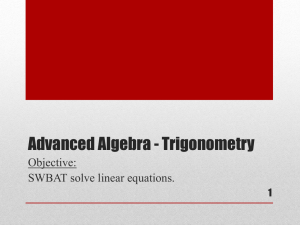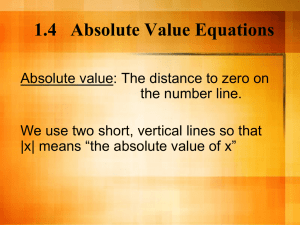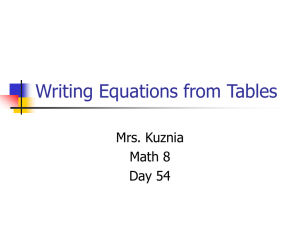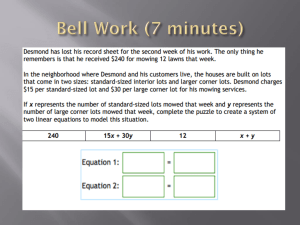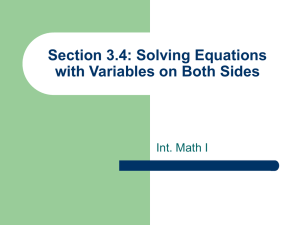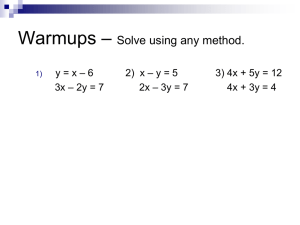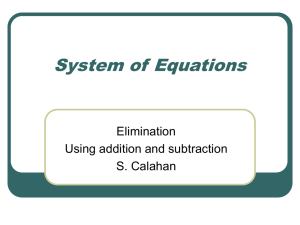Chapter 9 Systems of Linear Equations
advertisement
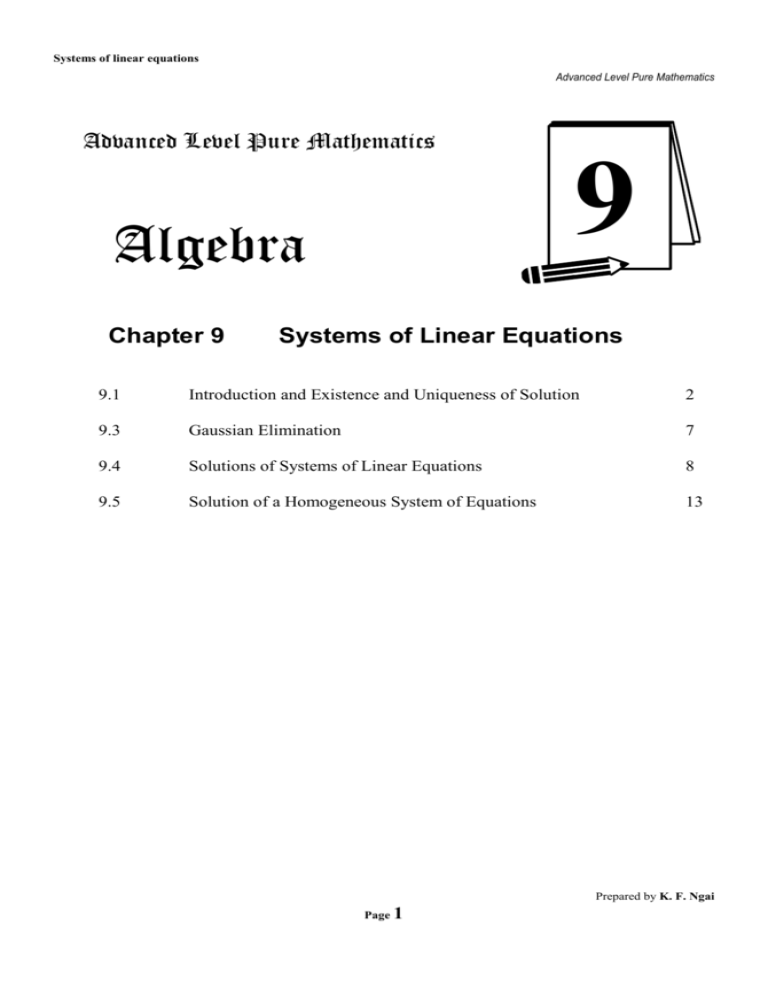
Systems of linear equations Advanced Level Pure Mathematics Advanced Level Pure Mathematics 9 Algebra Chapter 9 Systems of Linear Equations 9.1 Introduction and Existence and Uniqueness of Solution 2 9.3 Gaussian Elimination 7 9.4 Solutions of Systems of Linear Equations 8 9.5 Solution of a Homogeneous System of Equations 13 Prepared by K. F. Ngai Page 1 Systems of linear equations Advanced Level Pure Mathematics 9.1 Introduction and Existence and Uniqueness of Solution Consider three equations in three unknowns, i.e. a11 x1 a 21 x1 a x 31 1 i.e a12 x2 a13 x3 b1 a 22 x2 a32 x2 a 23 x3 a33 x3 b2 b3 In Matrix From. a11 a 21 a 31 a12 a 22 a32 a13 x1 b1 a 23 x2 b2 a33 x3 b3 The system of three linear equations may be rewritten as AX B If B 0 , the system is called a non-homogeneous system of linear equations. For A 0 , A 1 exist. The system becomes AX B X A1 B Three linear equations will have a unique solution. In this case, three linear equations are said to be linearly independent. Theorem 9-1 Let A be a square matrix. If A is a non-singular matrix, i.e. det A 0 , then the system of linear equations AX B has a unique solution given by X A1 B . Example 1 Use the method of inverse matrix to solve the system of equations 3 x 2 y 4 x y 3 Prepared by K. F. Ngai Page 2 Systems of linear equations Advanced Level Pure Mathematics Example 2 Solve the system of equations 2 x y z 4 4 x 7 y z 11 4 x y 7 z 3 Example 3 Example 4 2 x y z 4 0 Solve 4 x 7 y z 11 0 4 x y 7 z 3 0 Discuss the number of solutions to the following systems of linear equations: x 2y 3 x 2y 3 (a) (b) 2 x 4 y 4 2 x 4 y 6 Prepared by K. F. Ngai Page 3 Systems of linear equations Advanced Level Pure Mathematics Theorem 9.2 Let A be a n n matrix. If det A 0 , then the linear system Ax b has no solution or infinitely many solutions. Example 5 Consider the following system of linear equations: (a 1) x y z 1 x (a 1) y z a x y (a 1) z a 2 Determine the condition that the system has a unique solution. Prepared by K. F. Ngai Page 4 Systems of linear equations Advanced Level Pure Mathematics Theorem 9-3 Cramer's Rule If A 0 , then x1 b1 b2 b3 a12 a 22 a32 a13 a 23 a33 A x2 Example 6 4 x y 2 z 15 Solve x 2 y 3z 9 2 x y z 0 Example 7 5 x 2 y 13 Solve 2 x 3 y 9 a11 b1 a 21 b2 a31 b3 A a13 a 23 a33 x3 a11 a 21 a31 a12 a 22 a32 b1 b2 b3 A Prepared by K. F. Ngai Page 5 Systems of linear equations Advanced Level Pure Mathematics Example 8 2 x 5 y 4 z 2 Show that the system x 9 y 7 z 5 has a unique solution if k 8 . kx 3 y 2 z 2k Hence, solve the system by the Cramer's rule. Prepared by K. F. Ngai Page 6 Systems of linear equations Advanced Level Pure Mathematics 9.3 Gaussian Elimination Elementary Transformation The elementary operations ( or elementary transformations ) in the process of elimination are: (1) Interchange of two equations; (2) Multiplication of an equation by a non-zero scalar; (3) Addition of a scalar multiple of any equation to another equation. If the system of equations is written in matrix form, we have the following corresponding elementary row operations for the matrices: (1) (2) (3) Interchange of any rows; Multiplication of any row by a non-zero scalar; Addition of a scalar multiple of any row to another row. Example 9 By using Gaussian elimination, solve the system of linear equations 4 x y 2 z 15 x 2 y 3z 9 2 x y z 0 Prepared by K. F. Ngai Page 7 Systems of linear equations Advanced Level Pure Mathematics Example 10 By using Gaussian elimination, solve the system of linear equations 4y z 5 2 x y 3z 13 x 2 y 2z 3 9.4 Solution of systems of linear Equations Definition Example An inconsistent system of equation is one for which the solution set is the empty set x 0 x 2 y 1 and y 0 x 2 y 5 x 6 Definition A consistent system of equations is one for which there exists a non-empty solution set. Example 2 5 x 4 y x 2 y 1.7 Example x 2y 1 has infinite many solutions 2 x 4 y 2 Prepared by K. F. Ngai Page 8 Systems of linear equations Advanced Level Pure Mathematics Definition If the solution set of a consistent system of equations contains one and only one element, the system is said to have unique solution. Definition If the solution set of a consistent system of equations contains more than one element, the system is said to have non-unique solution set ( infinitely many solution ) 4 x 6 y z 2 Example 11 Solve 2 x y 4 z 3 3x 2 y 5 z 8 Determine whether the system is consistent. If the system is consistent, solve it. Prepared by K. F. Ngai Page 9 Systems of linear equations Advanced Level Pure Mathematics 1 1 3 9 x Example 12 Let A 1 3 11 , X y and B 7 . 1 13 21 53 z (a) Find A . What conclusion can you make for the system AX B . (b) Solve it. x y z 5 Example 13 Solve 4 x 3 y z 2 5 x 3 y z 11 Prepared by K. F. Ngai Page 10 Systems of linear equations Advanced Level Pure Mathematics 2 y 4z 1 x Example 14 Solve 2 x 4 y 8 z 2 3x 6 y 12 z 3 x 2 y 3z 2 x 3 y 2 z Example 15 Solve 4 x y z 4 x y 4 z 2 5 2 1 Prepared by K. F. Ngai Page 11 Systems of linear equations Advanced Level Pure Mathematics x y 3z k Example 16 Given the system 6 x 7 y 5 z 2 has infinitely many solutions . 4 x 5 y hz 1 Find h, k and the solution of the system. px y z 6 3x y 11z 6 2 x y 4 z q Example 17 (a) (b) Find the condition of (i) a unique solution (ii) no solution (iii) infinitely many solutions x y z 3x y 11z Hence solve 2 x y 4 z xz 6 6 6 9 0 Prepared by K. F. Ngai Page 12 Systems of linear equations Advanced Level Pure Mathematics 9.5 Solution of a Homogeneous System of Equations From Theorem 9.1 and Theorem 9.2, the solution of non-homogeneous system of n linear equations in n unknowns. AX B has 3 possibilities: (1) If det A 0 , the system has a unique solution. (2) If det A 0 , has no solution or infinitely many solutions. On the other hand, the homogenous system AX 0 always has zero solution( trivial solution). Hence, there are only two possible cases for the solution of a system of homogeneous equations: (1) If det A 0 , the system has only zero solution (trivial solution). (2) If det A 0 , the system has non-zero solutions (non-trivial solution), i.e. it has infinitely many solutions. For AX 0 a 11x 1 a 21x 1 a x 31 1 a 12 x 2 a 13 x 3 0 a 22 x 2 a 32 x 2 a 23 x 3 a 33 x 3 0 0 x 1 x 2 x 3 0 is the solution of system. (1) x 1 x 2 x 3 0 is Trivial Solution det A 0 A 1 exist AX 0 X A 1 0 X 0 (2) the system has trivial solution. det A 0 the system has non-trivial solution. Prepared by K. F. Ngai Page 13 Systems of linear equations Advanced Level Pure Mathematics Example 18 x y z 0 3x y 2 z 0 2 x 2 y z 0 x y z 0 Example 19 Find the non-trivial solution for 3x 2 y z 0 Prepared by K. F. Ngai Page 14 Systems of linear equations Advanced Level Pure Mathematics x ky 3z 0 Example 20 If 3x 2 y 2 z 0 , 2 x 3 y kz 0 find the values of k such that the system has (a) trivial solution (b) non-trivial solution and the solution set. Example 21 Consider the system of linear equations 2z 0 2 x y (*) x (k 1) z 0 kx y 4z 0 Suppose (*) has infinitely many solutions. (a) Find k . (b) Solve (*). Prepared by K. F. Ngai Page 15 Systems of linear equations Advanced Level Pure Mathematics Example 22 Consider the following system of linear equations: 3 x y z 1 (*)2 x 4 y 5 z 1 , 4 x 2 y 7 z c where c R . Suppose (*) is consistent. Find c and solve (*). Prepared by K. F. Ngai Page 16 Systems of linear equations Advanced Level Pure Mathematics Example 23 Consider the system of linear equations x y z k ( S ) : x y z 1 where , k R . 3x y 2 z 1 (a) Show tat (S ) has a unique solution if and only if 0 and 2 . (b) For each of the following cases, determine the value(s) of k for which (S ) is consistent. Solve (S ) in each case. (c) (i) 0 and 2 , (ii) 0, (iii) 2. z 0 x If some solution ( x, y, z ) of y z 1 3x y 2 z 1 satisfies ( x p) 2 y 2 z 2 1 , find the range of values of p . Prepared by K. F. Ngai Page 17


